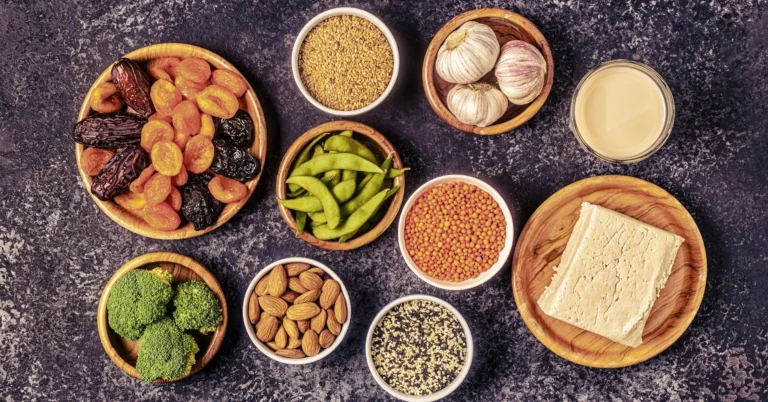Menopause is a significant life transition that can bring about various physical and emotional changes. One of the most effective ways to manage menopause symptoms and promote overall health is through mindful dietary choices. Understanding which foods to embrace and which to avoid can help ease symptoms and support well-being during this phase of life.
Foods to Embrace
- Fruits and Vegetables
Rich in vitamins, minerals, and antioxidants, fruits and vegetables should form the foundation of your diet. They can help combat inflammation and provide essential nutrients.
- Berries: Blueberries, strawberries, and raspberries are high in antioxidants and can help improve heart health.
- Leafy Greens: Spinach, kale, and broccoli are excellent sources of calcium and magnesium, which are vital for bone health.
- Whole Grains
Whole grains are a great source of fiber, which can help manage weight and improve digestive health.
- Oats: High in fiber and can help lower cholesterol levels.
- Quinoa: A complete protein that provides essential amino acids and is rich in magnesium.
- Healthy Fats
Incorporating healthy fats into your diet can help manage inflammation and support heart health.
- Avocados: Packed with monounsaturated fats, avocados can help improve cholesterol levels.
- Nuts and Seeds: Almonds, walnuts, flaxseeds, and chia seeds are rich in omega-3 fatty acids, which can help reduce the risk of heart disease.
- Lean Proteins
Protein is essential for maintaining muscle mass, especially as estrogen levels decline.
- Fish: Fatty fish like salmon and mackerel are high in omega-3 fatty acids and can help reduce inflammation.
- Legumes: Beans, lentils, and chickpeas are excellent plant-based protein sources and are high in fiber.
- Dairy or Dairy Alternatives
Calcium and vitamin D are crucial for bone health, especially during and after menopause.
- Low-Fat Yogurt: A good source of calcium and probiotics, which can support gut health.
- Fortified Plant-Based Milks: Almond, soy, or oat milk fortified with calcium and vitamin D can be great alternatives for those who are lactose intolerant.
- Herbs and Spices
Certain herbs and spices can help alleviate menopause symptoms.
- Turmeric: Contains curcumin, which has anti-inflammatory properties.
- Ginger: Can help with digestive issues and may reduce hot flashes.
Foods to Avoid
- Processed Foods
Highly processed foods often contain unhealthy fats, sugars, and additives that can exacerbate menopause symptoms.
- Sugary Snacks: Candy, cookies, and pastries can lead to weight gain and mood swings.
- Fast Food: Often high in unhealthy fats and sodium, which can contribute to heart disease.
- Caffeine
Caffeine can trigger hot flashes and disrupt sleep patterns.
- Coffee and Energy Drinks: Consider reducing intake, especially in the afternoon and evening.
- Alcohol
While moderate consumption may be acceptable, excessive alcohol can worsen symptoms like hot flashes and mood swings.
- Limit Intake: If you notice that alcohol triggers symptoms, consider reducing or eliminating it from your diet.
- Spicy Foods
Spicy foods can trigger hot flashes in some women.
- Monitor Your Response: If you notice an increase in hot flashes after consuming spicy foods, it may be best to limit them.
- High-Sodium Foods
Excess sodium can lead to water retention and increased blood pressure.
- Processed Meats and Canned Foods: Opt for low-sodium versions or fresh alternatives.
Nutrition plays a vital role in managing menopause symptoms and promoting overall health. By embracing a diet rich in fruits, vegetables, whole grains, healthy fats, and lean proteins, women can support their bodies during this transition.
Conversely, avoiding processed foods, excessive caffeine, alcohol, and high-sodium options can help alleviate discomfort and improve well-being.
As always, it’s essential to listen to your body and consult with a healthcare provider or a registered dietitian for personalised dietary advice tailored to your specific needs during menopause. With the right nutrition, you can navigate this phase of life with confidence and vitality.
Explore Our Menopause Wellness Retreat
Join us for a supportive and rejuvenating Menopause Wellness Retreat, where you’ll gain insights, connect with others, and embrace this stage of life with confidence. With workshops, mindfulness practices, and personal guidance, this retreat is designed to help you navigate menopause with ease and empowerment.
https://topremedy.co.uk/package_a-menopause-wellness-retreat/

